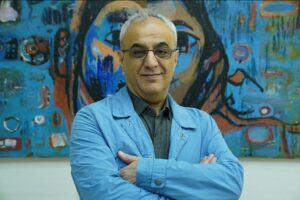Journeys to Humanism: Finding Meaning in Aiding Others

Journeys to Humanism, theHumanist.com’s regular series, features real stories from humanists in our community. From heartwarming narratives of growth, to more difficult journeys, our readers open up about their experiences coming to humanism.
Nasser Yousefi
Thornhill, Ontario, Canada
When I was a teenager, I didn’t like people. It’s something I boldly admit! I remember during my teenage years, I disliked people—especially adults. When going to school, university, or work, I always chose paths where I would encounter fewer people. Even if it meant taking a longer route, I preferred to go through less crowded areas.
My teenage years coincided with the 1979 revolution in Iran. I was eleven years old when the revolution happened, and I was involuntarily drawn into revolutionary and political events. At a time when I should have been falling in love, playing, and experiencing childhood, I was immersed in the news and events of countries like Vietnam, Algeria, Palestine, and Cuba.
I was thirteen when the Iran-Iraq War started. The war lasted eight years and claimed over a million lives on both sides. The nightmares of war, bombings, missile attacks, and young men going to fight and never returning still haunt me. Many days and nights, we took refuge in basements during bombings and missile attacks. As a teenager, my dream was that one day a missile wouldn’t fall on us! I would wonder if there would be a day when we could turn on the lights in our house at night without fearing bombings. I saw all these sufferings as the result of the selfish policies of adults. I disliked all the grown-ups. I disliked those who supported the war and those who exacerbated social and political pressures.
For this reason, I connected with intellectual circles during my university years. These included groups of writers, poets, and academic centers. I was a specialized and intellectual young person, but despite all this, I was not happy. Sometimes, I even felt like I was experiencing a form of depression. During my student years, I started collaborating with UNICEF’s representative office in my country, and then I worked for an NGO focused on children. Both UNICEF and the NGO’s efforts were concentrated on deprived areas. As a young psychologist specializing in educational psychology, I focused my activities on the underprivileged.
My work began with children and their families in remote villages, migrant camps, and urban outskirts. I dealt with issues such as malnutrition prevention, early childhood and development programs for deprived children, and the establishment of rural kindergartens and working-class daycare centers. I had to reach out to people who had no resources, lived in harsh conditions, and needed programs for their children.
Every month, I traveled to different places. I visited villages that were hard to find on the map. I had to communicate with people whose language I could barely understand. I had to work with children who were struggling with various diseases and malnutrition. I had to find solutions and make progress in those regions.
During those years, I realized that if I wanted to accomplish anything in deprived areas, I had to consult with the people themselves. Without the participation of their families, no program would succeed. Therefore, I spent many days talking to people, listening to them, paying attention to their needs, and most importantly, planning with them.
After a while, I realized how enjoyable it is to work with ordinary people. Working with the masses who led simple lives and were distant from politics was unparalleled. Each day that I spent working with people, I felt more alive. Gradually, I noticed that I was feeling better. I found motivation and was full of ideas.
During this period, due to my abilities, I became involved in activities to help groups of people in crisis situations. I advanced systems to care for children in the toughest natural disasters, such as earthquakes, floods, or social incidents. Slowly, I realized how much I loved people and how dedicated I was to improving their lives.
Working with Afghan, Iraqi, and Kurdish refugees helped me understand the conditions of other nationalities. After thirty years of working with people, I can say that people healed me. People connected me to life and helped me to have ideas and work towards improving lives.
For me, being a humanist means helping people to have a dignified life. It means providing diverse opportunities for the growth and flourishing of all groups of people without discrimination. Being a humanist means that “life” and laws are made with people and that laws should change for the people. Being a humanist means that the power of people can create a new form of history. For me, being a humanist means attending to all human needs and helping individuals to grow based on their abilities. I do not see an individual separate from other human beings. I believe each person finds meaning alongside other human groups.
We all have our own stories of how we came to be humanists, and we want to hear yours! Fill out the form here to be featured in this series.
